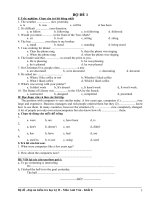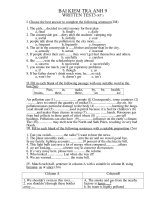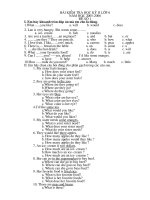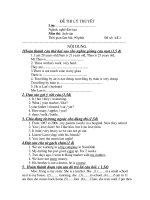bo de anh
Bạn đang xem bản rút gọn của tài liệu. Xem và tải ngay bản đầy đủ của tài liệu tại đây (171.6 KB, 8 trang )
Trường THCS Đan Phượng
ĐỀ CƯƠNG ÔN TẬP MÔN ANH
I. Grammar
1. Present Simple tense.( Thì hiện tại đơn)
- Usage : Để diễn tả các sự việc một cách tổng quát, không nhất thiết chỉ nghó đến hiện tại. Ta dùng thì này
để nói đến một sự việc nào đó xảy ra liên tục, lặp đi lặp lại nhiều lần, hay một điều gì đó luôn luôn đúng.
- Form: (+ ) S + V/V
s / es
+ ……………………. Ex -The earth goes around the sun.
( - ) S + don’t/doesn’t + V+ ……………… -We don’t have classes on Sunday.
( ? ) Do/Does + S + V + ………………….? - Does Lan speak French?
2.be + (not ) adjective + enough +to infinitive ( không ) đủ ……………… để
Ex: The water is hot enough for me to drink.
She isn’t old enough to be in my class
3. Near Future: Be going to ( thì tương lai gần )
- Form : S + is / am/ are + going to + Vinf
- Use : Dùng khi nói về một việc mà ai đó quyết đònh hay dự đònh sẽ làm trong tương lai.
Ex : There is a good film on TV tonight. I’m going to stay home to watch TV .
- Note : “Be going to” còn dùng để dự đoán một tình huống có thể xảy ra
Ex: I feel tired . I think I’m going to be sick.
4. Adverb of place ( Trạng từ chỉ nơi chốn ): outside, inside, there, here, upstairs, downstairs,
next to ,under,……………
Ex: The money was finally found under the boards.
5. Reflexive pronouns.( Đại từ phản thân) : myself, yourself, himself, herself, itself, ourselves,
yourselves, themselves .
- Diễn tả hành động trở lại với chính người thực hiện .
+ Nó có thể làm túc từ (Object ) Ex: Be careful. You’ll cut yourself.
+ Nó đứng ngay sau từ mà nó làm mạnh nghóa. Ex: An sent this letter itself.
- Đại từ phản thân làm mạnh nghóa cho chủ từ. Nó đứng ngay sau chủ từ, hoặc đứng ở cuối mệnh đề/ câu. Ex:
Mary herself cleaned the floor./ Mary cleaned the floor herself.
6. Modal verbs
- Form: + S + modal verb + V + ………. Ex : I can sing very well.
- S + modal verb + not + V + ……… Ex : Hoa may not come to the party tomorrow.
? Modal verb + S + V + ………….? Ex : May I come in ?
- Modal verb: must, ought to, have to, should, can, could, may
* MUST: diễn tả sự bắt buộc hay sự cần thiết Ex: He must do this exercise again.
Ex: We must drive on the right.
* HAVE TO : diễn tả sự bắt buộc
Ex: Your eyes are weak. You have to wear glasses.
* OUGHT TO + V(base form) (nên): diễn tả lời khuyên. Ex: We ought to obey our parents.
* SHOULD: diễn tả lời khuyên Ex: You should help the needed children.
* MAY / CAN / COULD : được dùng để diễn tả lời yêu cầu hay đề nghò
- Yêu cầu sự giúp đỡ: Can / Could + you + V + O / A, please? (Ex: Can you help me ,please.)
- Đề nghò giúp ai: May + I + V + O/A ?; Let + me + V + O/A. Do you need any help?
Ex: May I help you?
7. Questions with “WHY” : Dùng để hỏi về nguyên nhân hay lý do
1
Trường THCS Đan Phượng
Why + do /does/ did? + S + V + O . . . ?
Ex: Why do they cover the electric sockets?
Để trả lời cho câu hỏi với WHY ta có thể dùng :
- Mệnh đề với “because”. Ex: Why do you get up early? – Because I want to do exercise.
- Cụm động từ nguyên mẫu . Ex: Why do you do exercise? – To keep healthy.
8. Past Simple Tense (Thì quá khứ đơn)
- Use : Diễn tả hành động xảy ra và kết thúc tại một thời điểm xác đònh ở quá khứ
- Form: + S + V
-ed(regular)
/ V
2 ( column irregular)
+ ………… Ex : - He arrived here yesterday.
- S + didn’t + V + …………………. - She didn’t go to school yesterday.
? Did + S + V + …………………… ? - Did you clean this table?
- Note: Thì quá khứ đơn thường được dùng với các cum từ chỉ thời gian xác đònh ở quá khứ : last week / month
/ year . . ., a week / 3 days / 5 months . . . , yesterday, yesterday morning / evening, In+ năm, from 2000
to2005
- Cách đọc các đông từ ở quá khứ đơn với “ ED”:
+ “ ED”: được đọc là /t/ khi những động từ nguyên mẫu có âm tận cùng là
Ex : laughed , asked , helped , watch , pushed , dressed , ……………
+ “ ED”: đươcï đọc là /id/ khi những động từ nguyên mẫu có âm tận cùng là t , d.
Ex : needed , wanted , waited , ……
+ “ ED”: đươcï đọc là /d/ khi những động từ nguyên mẫu có âm tận cùng là các âm còn lại
Ex : enjoyed , saved , filled ,……….
9. Preposition of time ( Giới từ chỉ thời gian ) : at, in ,on, from . . . to, by, before, after, between,
- AT : + một điểm thời gian cụ thể Ex : We have class at one o’clock.
+ night Ex : I sleep at night.
- IN : + tháng/năm cụ thể Ex : I was born 1994
+ the morning/afternoon / evening Ex : We have class in the morning.
- ON: + ngày trong tuần Ex : We have class on Monday.
+ ngày tháng năm Ex: I was born on April 6, 2006
- FROM + một điểm thời gian + TO + một điểm thời gian
Ex: We have class from 7.00 to 10.15
10. Used to + V(bare) : diễn tả một thói quen trong quá khứ nay không còn
Ex: He used to play tennis when he was young.
11. Adverb of Manner( Trạng từ chỉ thể cách ): thường theo sau tân ngữ, đa số trạng từ chỉ thể
cách được cấu tạo từ tính từ thêm hậu tố “LY” : adjective + ly = adverb
EX: soft + ly -> softly bad + ly -> badly careful + ly -> carefully
Ex: This man drives carefully.
* Note: Một số tính từ khơng thể thêm “Ly” mà phải biến đổi hoặc giữ ngun:
Ex: good -> well
Hard -> hard fast -> fast
Ex: She sing well.
12. Commands, requests and advice in reported speech
* Commands in reported speech: Câu mệnh lệnh ở lời nói gián tiếp
( Don’t ) + V + O / A
→ S + told. . . + O + ( not ) + to infinitive + O / A
Ex: “Turn off the light before going top bed,” my mother said to me.
→ My mother told me to turn of the light before going top bed.
Ex: “Don’t play with matches,” the mother said.
2
Trường THCS Đan Phượng
→ The mother warned her child not to play with matches.
* Requests in reported speech: Câu yêu cầu ở lời nói gián tiếp
Please + (don’t ) + V + O / A hoặc ( Don’t ) + V + O / A , please
→ S + asked . . . + O + ( not ) + to infinitive + O / A
Ex: Please turn on the light.→ He asked me to turn on the light.
Ex: Please don’t make a noise here. → They asked us not to make a noise there.
* Advice in reported speech: Lời khuyên ơ lời nói gián tiếp . Lời khuyên có cấu trúc:
Ex: “Tim should work harder for exam” Miss Jackson said to Tim’s mother.
→ Miss Jackson said you should study harder for the exam.
13. Gerund (danh động từ ) : là dạng động từ tận cùng bằng “ – ING” và có chức năng của một danh
từ.
- Theo sau một số động từ : enjoy, like, don’t like, love, dislike, hate, stop, practice
Ex: I like reading books.
14. Present perfect tense( Thì hiện tại hoàn thành )
Ex: I have been here for 10 years.
She has learned English since 2009.
- Form: (+) I/ You/ We/ They + have + V(ed)/ V
P.P
He/ She/ It + has + V(ed)/ V
P.P
(-) I/ You/ We/ They + have not + V(ed)/ V
P.P
(have not = haven’t/ has not = hasn’t)
He/ She/ It + has not + V(ed)/ V
P.P
(?) Have + I/ you / we/ they + V(ed)/ V
P.P
?
Hasv + he/she/it + V(ed)/ V
P.P
?
- Use :- Dùng để miêu tả một hành động xảy ra trong quá khứ nhưng kết quả còn lưu đến hiện tại
- Dùng để miêu tả một hành động đã xảy ratrong quá khứ tính đến nay đã xảy ra được bao lâu (FOR)
hoặc đã xảy ra từ lúc nào (Since)
* For + khoảng thời gian Ex: You have studied English for 4 years.
* Since + mốc thời gian xác định Ex: She has studied English since 2003.
15. Comparison of adjectives and adverbs
1. So sánh bằng
- Dạng khẳng đònh: S + be + as + adj + as + Noun Ex: Mai is as tall as Lan .
- Dạng phủ đònh: S + be + not + as + adj + as + Noun Ex: Mai isn’t as tall as Lan
2. Similarity ( Sự tương đồng) : Để diễn tả sự tương đồng ,ta có thể dùng :
- LIKE ( giống, như ) Ex: He‘s like his father.
- THE SAME AS ( giống như ) Ex: Your shirt is the same as Ba’s.
- DIFFERENT FROM ( khác với ) Ex: He’s different from his mother.
16- Present progressive Tense ( Thì hiện tại tiếp diễn )
- Use : Diễn tả một hành động xảy ra vào đúng thời điểm nói.
-Form : + S + is / am/ are + V
-ing
+ …………… Ex : I’m learning English now.
- S + is / am/ are + not + V
-ing
+ …… He isn’t learning English now.
? Is / Am / Are + S + V
-ing
+ ………? Is he reading books now?
- Note: Thì hiện tại tiếp diễn thường dùng kèm với các trạng từ : now, right now,at present , at the moment để
nhấn mạnh tính chất đang diễn tiến của hành động ở ngay lúc nói .
* Note Present progreesive: - To talk about the future: (dự định trong tương lai)
Ex: What are you going to do tonight? -> I’m playing table tennis.
- to show changes with “get” and “become” (sự thay đổi)
3
Trường THCS Đan Phượng
Ex: The boys are geeting taller.
17- Comparative and superlative adjectives ( So sánh hơn và nhất )
1. Comparative (So sánh hơn):
- Tính từ có một âm tiết : Adjective –er + than Ex: I’m stronger than you.
- Tính từ có hai âm tiết trở lên: More + adj +than Ex: My sister is more beautiful than me.
2. Superlative ( So sánh hơn nhất):
-Tính từ có một âm tiết : The + Adj –est Ex: This tower is the tallest.
- Tính từ có hai âm tiết trở lên: The + most + adj Ex:Hoa is the most beautiful in my class
Note : Một số tính từ bất qui tắc
Good - better - the best fast - farther - the farthest
Bad - worse - the worst further - the furthest
II. Exercises
4
Trường THCS Đan Phượng
I. A. Choose the word that has the underlined part pronounced differently from the others:
1. A. pancake B. stadium C. tasty D. change
2. A. grocery B. money C. month D. comfort
3. A. effect B. delicious C. president D. selection
4. A. just B. summer C. much D. humid
5. A. started B. helped C. watched D. decided
B. Find the word which has different stress from the rest:
6. A. humid B. airmail C. discuss D. pancake
7. A. notice B. effect C. contact D. surface
8. A. concern B. comfort C. product D. market
9. A. customer B. grocery C. resident D. delicious
10. A. organize B. community C. restaurant D. neighborhood
II. Choose the best answer to complete these sentences
1. I ______ a letter from my old friend last week. (sent / gave / received / took)
2. We must be there ______ 7.30 and 10.30. (at / before / between / after)
3. I find Peter is not communicative. He’s rather ______ in public. (kind / reserved /sociable / humorous)
4. She has ______ over 30 pages since yesterday. (written / wrote / write / writing)
5. You have a bad toothache. You go to see the dentist. ( must/ have to/ can/ ought to)
6. My farther used ______ us to the park three years ago. (took / taking / to take / take)
8. Can you fill ______ this form for me? (out / on / at / to)
9. “Would you ______ to go to the movies with me?” “I’d love to” (like / want / love / mind)
10. We need to finish our job _____ 4.30 pm and 5.30 pm. (before/ between/ after/ at)
11. When I was a child, I ______ follow my mum to the market. (used to / liked / hated / loved)
12. His parents are always proud ______ him. (about / of / on / with)
13. ______ have you lived in this town? – For nearly 20 years. (When / Where / How far /How long)
14. The new shopping mall is quite ______ the present shopping area. (different from/ the same/ like to/ similar)
15. They have studied ______ six o’clock. (for / at / since / to)
16. “____________?” – “It’s 20.000 dong” (How much is this parcel cost / How much does this parcel take /
How much does this parcel / How much does this parcel cost)
17. This person is short and thin. She has…………… hair. (a long black/ black long/ black short/long black)
18. They have studied ______ three hours. (for / at / since / to)
19. He does morning exercises regularly in order to ______ his health. (have / improve / get / take)
20. Don’t let your child ______ with matches. (playing / to play / plays / play)
21. They ______ from Canada to America to find work. (started / demonstrated / delivered / migrated)
22. Last night I watched the movie Romeo and Juliet. At last they killed ______. (together/ each other/
themselves / one another)
23. My mother is ______ tired ______ cook tonight. (enough – to / too – to / so – that / very – to)
24. He went to school late because he was stuck in the ______ this morning.(rush-hour / traffic-light / traffic-
jam / cross-road)
25. Airmail is ______ expensive than surface mail. (the most / most / much / more)
27. Ho Chi Minh Communist Youth Union is an ………….for Vietnamese teenagers. (organizational/
organizationally/ organization/ organizatic)
28. John came ______ an old school friend in the street this morning. (with / along / across / off)
29. She asked her children ______ (to stop playing / stop to play / stop playing / stopping to play)
30. He is not ______ ride a motorbike. (enough old to / enough old for / old enough to / old enough for)
31. I don’t talk much in public. I am rather (kind / sociable / reserved / humorous)
32. The children go to school . ( myself/ himself/ herself/ themselves)
33. You must look in the (advertisement / recreation / diversion / participation) section of the newspaper to find
out what films are showing.
34. The moon around the earth (went/ goes/ go/ going)
35. (Would / Could / Do / Will) you like to go to the movies? – I’d love to.
36. Don’t go , it is too cold. (inside/ outside/ downstairs/ upstairs)
37. They have waited for her (for / since / at / from) 6 o’clock.
38. This neighborhood is (different / the same / as / like) from that one.
39. What does she look like? (She look beautiful / She is beautiful / She looks like beautiful)
5
Trường THCS Đan Phượng
40. The calendar is (on / under / behind / in) the clock.
41. Minh and I didn’t enjoy (myself / ourselves / himself / themselves) at the party.
42. When my father was young, he used to (singing / sang / sings / sing) very well.
44. You should work (hardly / hard / good / badly) in order to pass the exams.
45. It is too dark (to take / take / taking / took) photographs here.
46. Jim is not old enough (read / reading / to read) this book.
47. Could you do me a favor? (What can I do for you / Thanks a lot / It’s very kind of you / No, thank you. I’m
fine)
48. I (haven’t met / don’t meet / didn’t meet / won’t) since 2008.
49. The doctor said he (should go/ to go /going/ goes) to bed earlier.
50. They got married and lived (happy / happily / happiness)
III. Supply the correct tense of the verbs in brackets
1. Mary and John (be) _________ neighbors. They (know) _________ each other for a long time. Mary (move)
_________ into her house in 1990, and John (live) _________ next door since he (come) _________ to the area in
1988.
2. Today (be) _________ Sunday. Nga (not go) _________ to school. She (stay) _________ at home. She (do)
_________ her homework now. She (do) _________ it for two hours.
3. I (be) _________ in New York. I (come) _________ here two years ago. My friend, Nancy (live) _________
here since 1982. So she (know) _________ the area very well.
4. Trung usually (go) _________ to the library three times a week.
5. Yesterday I (be) _________ busy, so I (not have) _________ time to phone you.
6. Mrs. Trang (not go) _________ to work last week. She (not be) _________ feeling well.
7. I (do ) _________ all the housework. The flat is really clean now.
8. How long you (live) _________ here? – Since 1997.
9. Mr. Quang (teach) _________ in this school since he (graduate) _________ from the university in 1989.
10. My brother (leave) _________ home 10 years ago. I (never meet) _________ him since then.
11. Where you (spend) _________ your summer holiday last year, Tam?
12. When we (be) _________ young, our family (live) _________ in the countryside.
13. I (read) _________ an interesting book at the moment.
14. How long you (know) _________ Mrs. Chi? – I (know) _________ her for five years.
15. We (not see) _________ her since we (be) _________ on holiday in Ha Long bay.
16. Phuong (finish) _________ her homework tonight.
17. It’s three years since I last (see) _________ Nam.
18. You (be) _________ away? – Yes. I (go) _________ to the country last Sunday.
19. I (not eat) _________ anything for two days.
20. They (move) _________ to Ho Chi Minh City in 1990 and (live) _________ there since then.
IV. Writing
A. Rewrite these sentences.
1. “Could you help me with my English speaking, Ba?”
Minh told
2. “You shouldn’t make noise in class, Trung”
The teacher said__________________________________________________________________
3. “Can you wait for me here, Jerry?”
Tom told ________________________________________________________________________
4. “Could you buy me an English exercise book, Ha?”
Nam asked ______________________________________________________________________
5. “ Get up early to learn your lesson, Toan”
Toan’s father told him _____________________________________________________________
6. “ You should improve your English pronunciation, Nga”
Nga’s teacher said ________________________________________________________________
7. “ You should stay in bed for a few days, Mr. Hoang”
The doctor said __________________________________________________________________
6
Trường THCS Đan Phượng
8. Hung is strong. He can carry that heavy box.
Hung is
9. The fire isn’t very hot. It won’t boil the kettle.
The fire ________________________________________________________________________
10. The weather wasn’t warm. We couldn’t go swimming.
The weather ____________________________________________________________________
11. Jane is a skillful swimmer.
Jane ___
12. Lan learns English very well.
Lan is __________________________________________________________________________
13. Loan is a good swimmer.
Loan ___________________________________________________________________________
14. Hung run very fast.
Hung is _________________________________________________________________________
15. Plays are not as interesting as films.
Films are ______
16. English isn’t as difficult as French.
French is _______________________________________________________________________
17. Jill is more intelligent than Bill.
Bill isn’t ________________________________________________________________________
18. I’m lucky . I have a friend like you.
I’m lucky enough_________________________________________________________________
19. My father often smoked 20 cigarettes a day, but now he doesn’t smoke any more.
My father used___________________________________________________________________
20 Tom is very strong. He can lift that heavy table.
Tom is strong_______________________________________________________________
21. Nam’s father drank a lot of wine ten years ago but now he doesn’t .
Nam ‘s father used to__________________________________________________
B. Write complete sentences from the following sets of words and phrases.
1. I/ be / proud/ my sister / because/ she/ always / study well.
…………………………………………………………………………………………………
2. Yesterday/ teacher/ say/ I/ work harder/ improve/ my English pronunciation.
………………………………………………………………………………………………
3. Jenny/ have/ Math/ three times/ a week.
…………………………………………………………………………………………………
4. We/ receive/ report/ ago.
…………………………………………………………………………………………………….
5. mother/ tell me/ spend more time/ History.
…………………………………………………………………………………………………
6. Last semester/ she/ get good grades/ Science/ but/ chemistry results/ poor.
………………………………………………………………………………………………….
7. grandmother/ tell him/ write/ her once.
………………………………………………………………………………………………
8. His mother/ very sad/ he/ study/ badly every semester.
…………………………………………………………………………………………………….
9. Bao/ spend/ free time/ doing volunteer work.
…………………………………………………………………………………………………
10.Song/ always/ play soccer/ every Saturday afternoon, but/ last Saturday afternoon/ he/ play
basketball
……………………………………………………………………………………………….
11.we/ raise/ funds/ by/ collect/ waste paper/ and break/ glass.
7
Trường THCS Đan Phượng
………………………………………………………………………………………………
12.We/ going/ clean/ lakes’ banks/ weekend
…………………………………………………………………………………………………
8









